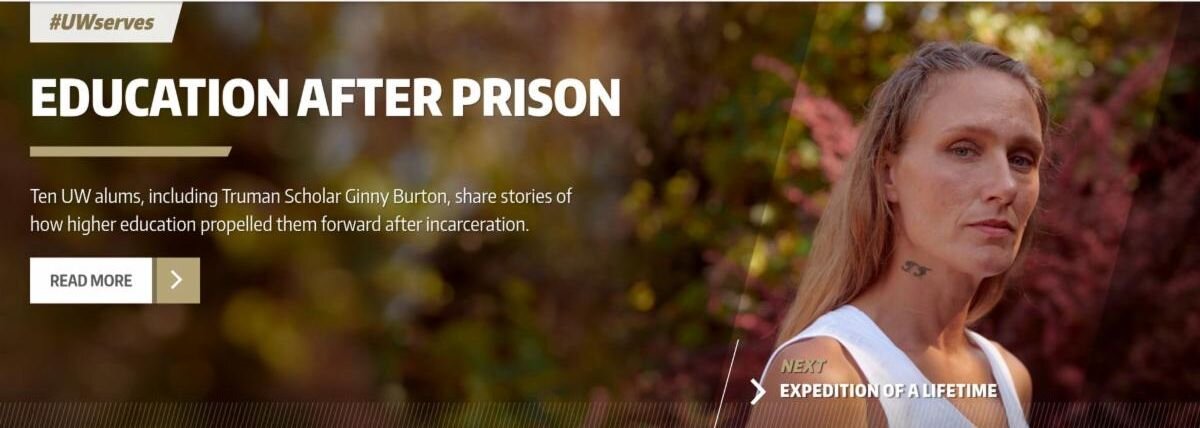A story of resilience and change: The manifestation of the power of support

Ginny Burton was recently featured on University of Washington’s homepage for her endeavors in higher education.
We can all agree our community needs a way to offer those struggling hope of and resources for recovery and a better life. But the problem isn’t that our city is devoid of any system of providing those resources, and the answer is not to funnel money into a new structure that we construct from the ground up. The city—in fact, Washington State—has an organization that is doing exactly what is needed: The Post-Prison Education Program provides the resources and individualized support that are not just helpful but are crucial to pulling individuals out of the throws of repeated incarceration, substance abuse and other mental health challenges, and homelessness.
Ginny came to the Post-Prison Education Program in December 2010. When she was just four years old, Ginny’s father was arrested and taken away for a life-sentence. At six, she was introduced to drugs and alcohol. At 16, she experienced an inexpressibly violent kidnap and rape.
Within a year of her setting foot inside the doors of our Program, Ginny was a student at Shoreline Community College, excelling in her studies plus working as a reporter and business manager for their student newspaper.
In May 2011, Ginny suffered a staggering setback. She married someone from her past who, on the night of their honeymoon, beat her to within an inch of her life. The trauma triggered a crash-and-burn relapse that engulfed her for two years. Her world became one of unremitting violence, drugs, addiction, and abuse.
Late 2012, Ginny called, desperate to find a way forward, not just for herself, but for her children. We urged her to enter an intensive treatment program. After months of counsel and equivocation, she agreed. We arranged a hearing before the Superior Court. Looking at her criminal record, the judge expressed doubt Ginny could complete the King County Drug Diversion Court, but on a trial basis agreed to the Transitional Recovery Program (TRP). For 60 days, Ginny fought for success. When she walked back into the courtroom, the judge accepted her into the Drug Diversion Court program—and Ginny has never looked back.
She moved into clean and sober housing protected from domestic violence and focused on sobriety, her children, and counseling. Two years later, speaking to a packed King County Drug Diversion Court, Ginny announced the end of her 30-year relationship with the criminal justice system:
“Today marks not just the graduation from Drug Court but probably the most important graduation I have ever, I will ever have, in my life, and that is the end of a 30-year relationship as a defendant in the Washington state criminal justice system.”
The hurdles and tumult Ginny faced are like no other. There were times she wanted to die and times we believed she would. To many, the cards she was dealt and the devastation she endured would have signaled defeat and hopelessness. For Ginny, and so many others, we leverage every resource we have to fight against defeat.
Since Ginny’s darkest moments, she has overcome addiction, reentered society following multiple incarcerations, graduated community college with high honors, and not only gained meaningful employment, but became a key supervisor with Catholic Community Services. She is a first-generation college student at a top-tier university, she has earned numerous scholarships and accolades, and now has her sights set on a Master’s Degree in Public Policy.
In KOMO’s recent documentary, The Fight for the Soul of Seattle, Ginny shared her story. Her path to recovery aids in host Eric Johnson’s argument that Seattle must do more than sit by and wait for those struggling to seek help on their own volition. The documentary purports a desperate need for a “hope haven”— a facility designed to take those facing addiction and mental health challenges off the streets and guide them through an intense, multi-level rehabilitation process. The problem is, Johnson’s so-called “hope haven” already exists: Post-Prison Education Program has the tools, the expertise, and the infrastructure to bring its support and resources to so many of the individuals suffering in our communities. It is Eric Johnson’s so-called “hope haven.” The Post-Prison Education Program does remedy problems facing our city. Ginny Burton is living proof of that power, as are so many others whom the Program has served.
We share Johnson’s vision of a holistic, human-centered approach to solving the drug and crime crisis. The reason for the persistent crisis isn’t the lack of a solution; it’s the lack of funding of the right programs—the lack of dollars put into the Post-Prison Education Program.
There is no single solution, no perfect treatment, no “one size fits all” approach to helping people recover from trauma. Meeting the needs of each individual at the place they are at, rather than where we think they should be, is the best pathway to success. Yes, it is expensive and resource intensive. But when you see the return on investment that comes from the many people like Ginny who have found success, purpose, and hope via the Post-Prison Education Program... there is no need for further cost-benefit analysis.